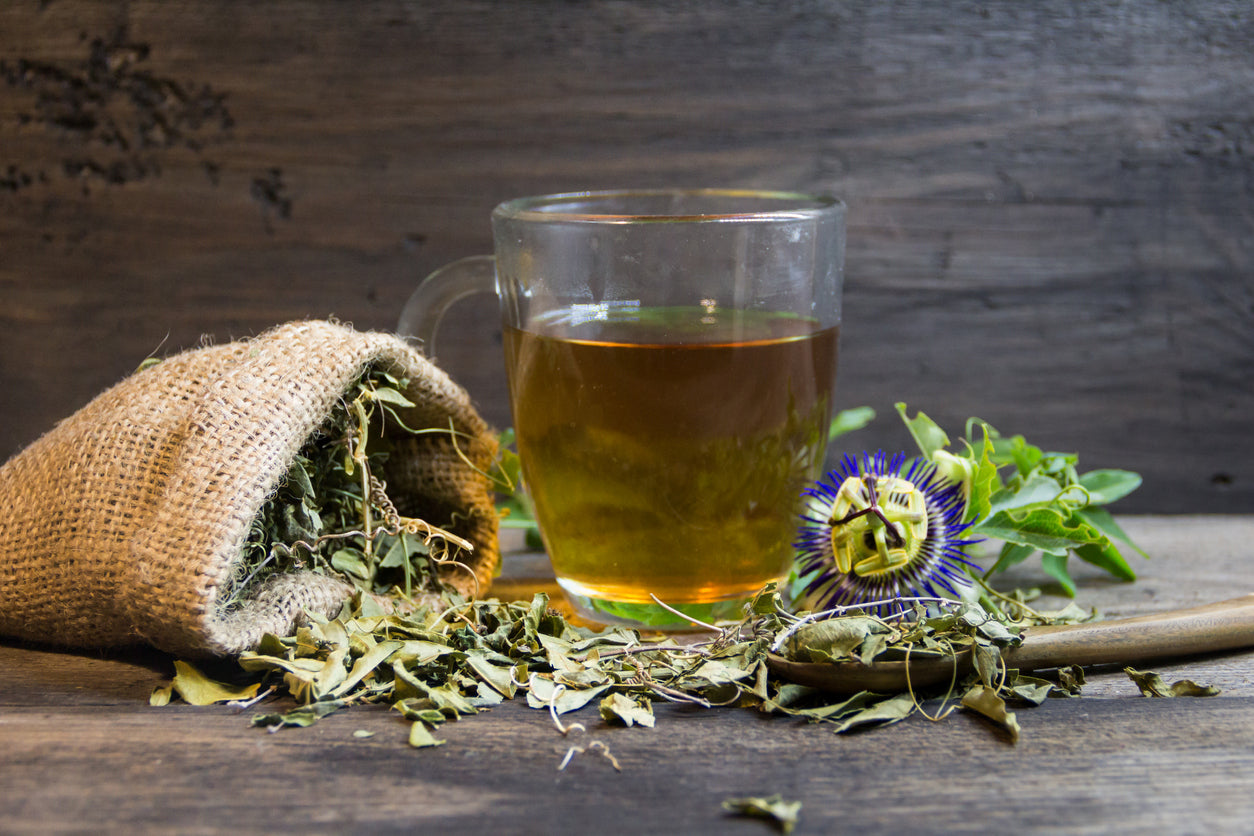Stressed? Calm jangled nerves and promote restful sleep with passionflower

Botanically known as Passiflora incarnata – and also called maracuja and corona de cristo – the passionflower has curly, tentacle-like petals that give it an exotic, other-worldly look. Despite its flamboyant appearance, passionflower has a reputation in herbal medicine for helping to “re-set” jangled nerves and restore a mellow, peaceful mood. But how, exactly, does passionflower achieve this, and what other benefits can it offer? Let’s take a look.
Relieve routine sleeplessness and ease nervousness
Studies have shown that passionflower has anxiety-calming and mild sedative effects. Scientists have learned that passionflower may promote relaxed mood and restorative sleep by increasing levels in the brain of the calming compound GABA (gamma-aminobutyric acid) while reducing the activity of specific neurons that cause anxiety.
In one controlled study, participants drank a daily cup of passionflower tea for a week while writing in a sleep diary and undergoing overnight polysomnography on the last night. The researchers found that sleep quality was better in the passionflower group. In animal studies, passionflower also increased slow-wave (deep) sleep.
Alleviate uncomfortable menopause symptoms
In menopause, declining ovary function causes estrogen levels to plummet, resulting in increased anxiety, tension, stress, and disturbed sleep. As many people know, menopause can also cause unpleasant vasomotor symptoms, such as hot flashes, night sweats, and heart palpitations. (And, these are by no means rare. Over 50 percent of menopausal women report suffering from one or more of these troublesome sensations)! However, passionflower may help ease these, along with the “blue” moods accompanying normal menopause.
In a 2017 review in the peer-reviewed Journal of Menopausal Medicine, passionflower reduced uncomfortable sensations accompanying menopause, such as sleeplessness, irritability, and negative mood. (And, because these effects can be so mentally distracting, it’s good to know that passionflower may also help with focus, attention, memory, and concentration).
Passionflower helps balance an over-stimulating amino acid in the brain
The amino acid glutamate functions as a neurotransmitter or “chemical messenger” in the body. Glutamate regulates other neurotransmitters - including dopamine and serotonin (both “feel-good” chemicals necessary for stable mood). However, glutamate is excitatory, meaning that it stimulates nerve cells. When present in excessive amounts, glutamate is a real troublemaker, capable of causing brain inflammation and even killing brain cells through overstimulation.
Excessive glutamate also depletes glutathione, the body’s universal detoxifier and antioxidant. In addition, excess glutamate is associated with anxiety, restlessness, impulsivity, and restless sleep. The good news – and the likely key to passionflower’s calming abilities – is that passionflower increases GABA in the brain, helping to inhibit excess glutamate.
“Mellow out” with soothing passionflower tea before bedtime
In addition to containing GABA, passionflower is a rich source of antioxidants, anti-inflammatory flavonoids, and plant pigments, including rutin, quercetin, and luteolin. It also contains the amino acid glycine, one of the “building blocks” for the antioxidant glutathione.
Passionflower is available in liquids, tinctures, extracts, and teas. Natural health experts advise choosing a formulation that contains at least 0.8 percent flavonoids or isovitexin.
You can also make your own passionflower tea. Simply add one to two grams of the dried herb to 8 ounces of boiling water, steep for 10 to 15 minutes, strain, and allow to cool. For best results in relieving sleeplessness, drink an hour before bedtime.
Before trying passionflower tea or extracts, consult your integrative doctor. Passionflower tea can interact with medications and can cause dizziness and confusion when taken in excessive amounts.
For temporary feelings of irritability, distractibility, discontent, and nervousness – and for routine sleeplessness – the soothing passionflower could be just what the (holistic) doctor ordered.
Sources for this article include:
-
Posted in
amino acids, benefits of passionflower, gaba, relaxing herbs, restful sleep






